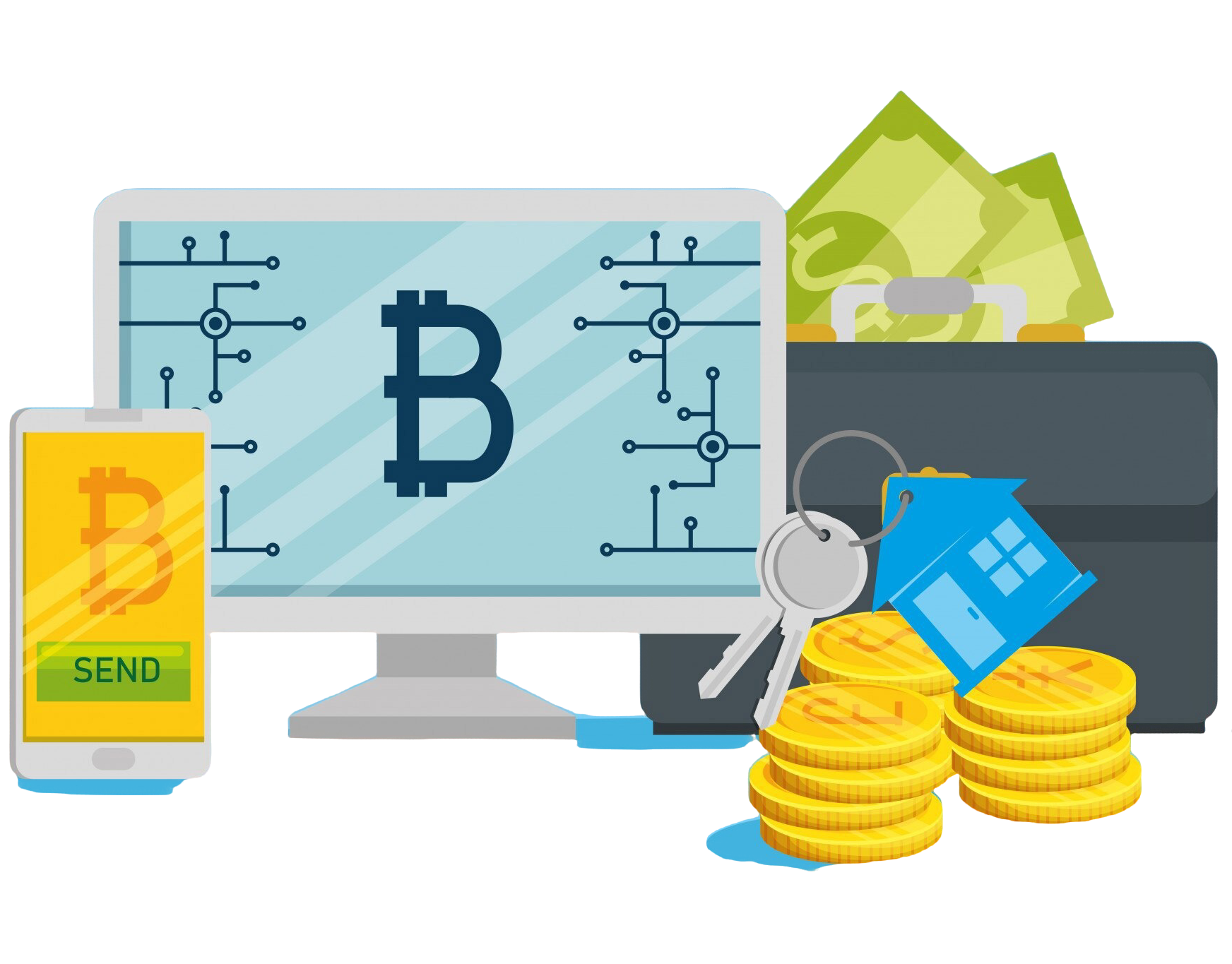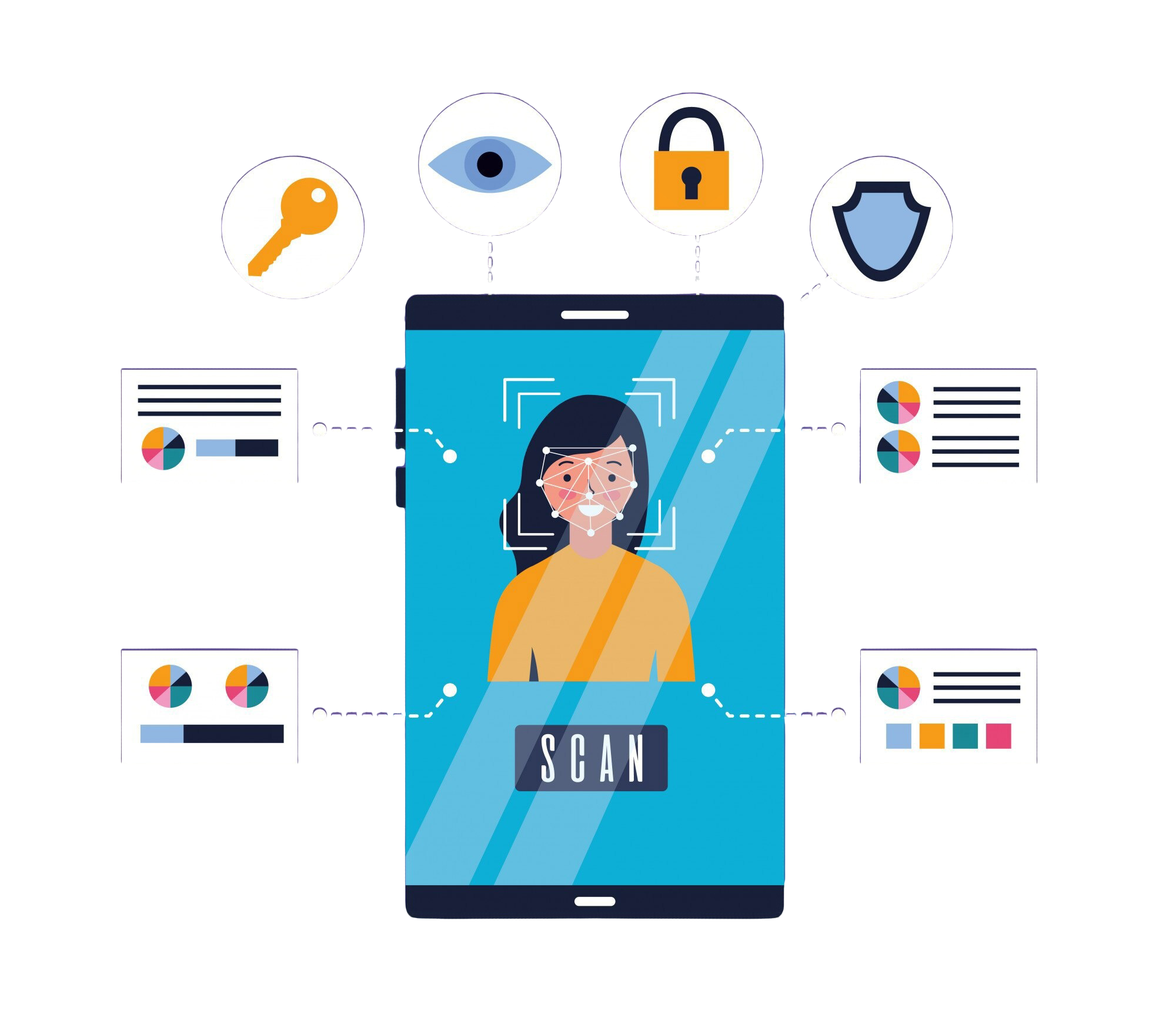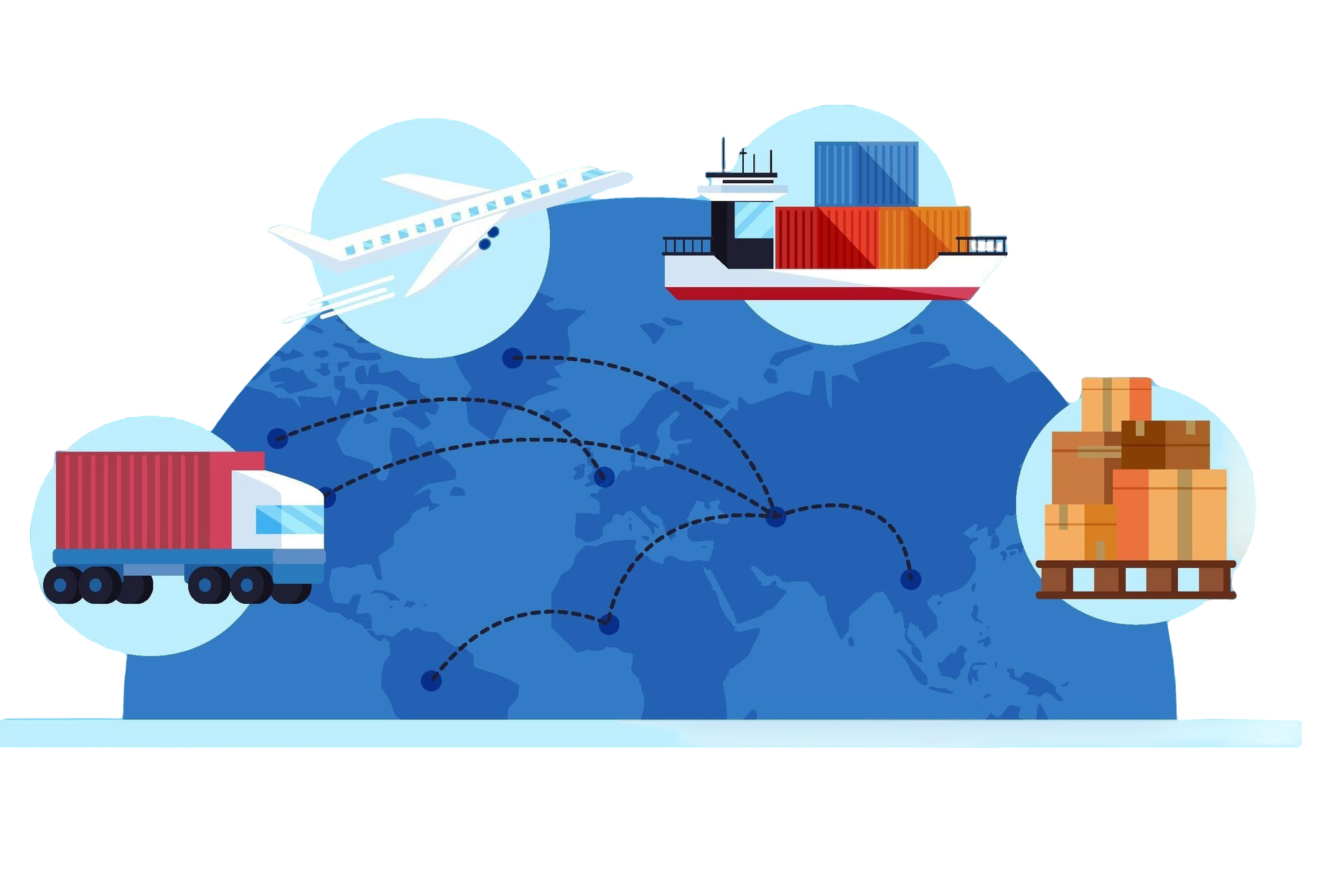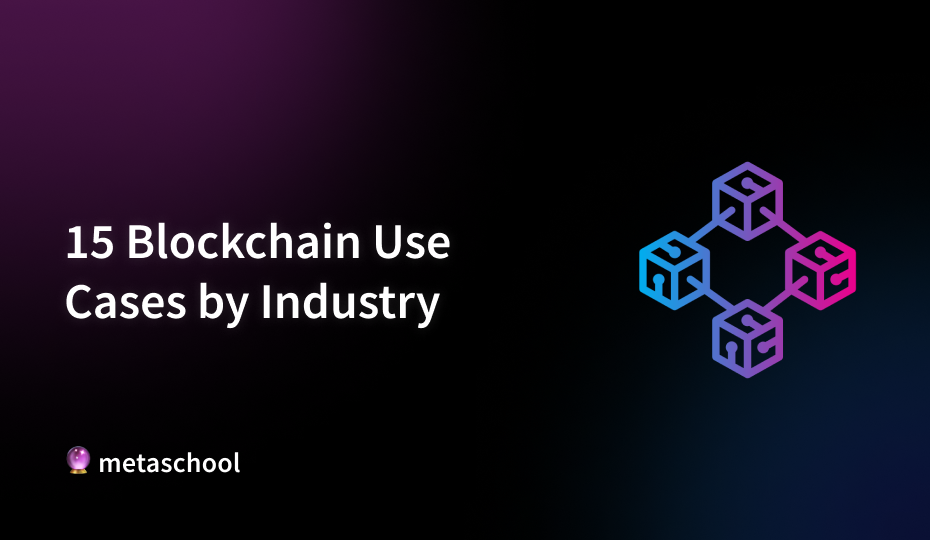Table of Contents
In a world that’s increasingly interconnected, technology continues to redefine the way we live, work, and interact. Among these advancements, blockchain is emerging as a transformative force, reshaping traditional systems with solutions that are faster, more efficient, and more secure. From enhancing financial transactions to streamlining global supply chains, blockchain has proven to be far more than a buzzword.
As industries explore its potential, blockchain stands out for its ability to address some long-standing challenges like security and third-party monopoly and ultimately unlock new opportunities. For businesses and individuals, understanding the versatility and impact of blockchain technology is now essential to thrive, innovate, and achieve their full potential.
This guide delves into the diverse use cases of blockchain technology across various industries, providing an in-depth exploration of its transformative potential.
Capital Markets
Blockchain is transforming capital markets by addressing inefficiencies and introducing innovative processes that make financial systems more accessible, transparent, and secure. Let’s explore the use cases in detail.

Tokenization of Assets
Blockchain enables the tokenization of traditional financial assets such as stocks, bonds, and real estate. Tokenization converts these assets into digital tokens that can be traded on blockchain platforms. This allows for fractional ownership, where investors can buy smaller portions of high-value assets. For instance, instead of purchasing an entire property or share, investors can own a fraction, making investments more accessible to a broader audience. This innovation enhances liquidity in markets that were previously illiquid, such as real estate or private equity.

More you know
Liquid assets can quickly convert into cash, despite adverse market conditions, and with an immediate time horizon. Illiquid assets are difficult to convert into cash, which gets worse if the market suffers.
Peer-to-Peer Trading and Near-Instant Settlement
Traditional trading systems rely on multiple intermediaries, such as brokers and clearinghouses, to validate and process transactions. Blockchain eliminates the need for these intermediaries by enabling peer-to-peer trading directly between buyers and sellers. Transactions are recorded on an immutable ledger, ensuring accuracy and trust. Moreover, blockchain’s decentralized nature facilitates near-instant settlement, drastically reducing the time it takes to finalize trades from several days to just seconds. This not only improves efficiency but also reduces costs associated with intermediary fees and administrative processes.
Automation with Smart Contracts
Smart contracts, self-executing agreements built on blockchain, automate complex processes like dividend payments, bond issuance, and compliance checks. Once predefined conditions are met, smart contracts execute automatically, ensuring timely and accurate payouts without human intervention. For example, a company can issue dividends directly to token holders as soon as profits are recorded, eliminating delays and administrative overhead. This automation reduces errors and increases operational efficiency.

More you know
A dividend is a distribution of earnings, often quarterly, by a company to its shareholders in the form of cash or stock reinvestment. It is a reward paid to the shareholders for their investment in a company, and it usually is paid out of the company’s net profits.
Enhanced Transparency and Reduced Counterparty Risks
The immutable nature of blockchain provides an unparalleled level of transparency in capital markets. Every transaction is permanently recorded on a distributed ledger, accessible to all authorized participants. This transparency helps in reducing fraud, improving compliance, and fostering trust among market participants. Additionally, blockchain mitigates counterparty risks — the risk that one party in a transaction might default. By recording all transactions in real-time and automating agreements, blockchain ensures that both parties fulfill their obligations, reducing reliance on trust and manual verification.
Central Bank Digital Currencies (CBDCs)
Central Bank Digital Currencies (CBDCs) represent a groundbreaking shift in financial infrastructure, leveraging blockchain technology to modernize the way money is issued, managed, and used. By combining the stability of traditional fiat currencies with the innovation of blockchain, CBDCs offer numerous advantages for governments, financial institutions, and individuals alike. Let’s explore the use cases in detail.

Secure and Decentralized Issuance and Settlement
Blockchain technology underpins CBDCs with its decentralized, tamper-proof ledger system. Unlike traditional systems that rely on centralized databases, blockchain enables secure issuance and settlement processes that reduce the risk of fraud, tampering, or unauthorized access. Central banks can issue CBDCs directly to users through a distributed ledger, ensuring that all transactions are transparently recorded and verifiable. The use of blockchain enhances the efficiency of interbank settlements, allowing banks to process large-scale transactions seamlessly and in real time. By eliminating intermediaries and providing instant settlement capabilities, CBDCs reduce delays and associated costs, making financial systems more robust and efficient.
Enhanced Financial Inclusion
CBDCs have the potential to bridge the financial gap for unbanked and underbanked populations. Traditional banking infrastructure is often inaccessible or costly for people in remote or economically disadvantaged areas. By enabling direct access to digital currencies through mobile devices, CBDCs eliminate the need for intermediaries like commercial banks, allowing individuals to participate in the digital economy with minimal barriers. For example, a farmer in a rural area could receive government subsidies directly into a digital wallet in the form of CBDCs, bypassing the need for a local bank branch. This accessibility can empower individuals, stimulate economic activity, and foster greater financial equity.
Programmable Money for Enhanced Functionality
One of the most transformative aspects of CBDCs is their programmability. Leveraging blockchain’s smart contract capabilities, CBDCs can incorporate programmable features to execute predefined rules automatically. For example:
- Wallet limits: Governments or central banks can impose spending caps on certain types of transactions to curb misuse or promote financial discipline.
- Conditional transfers: Funds can be programmed to be released only when specific conditions are met, such as meeting eligibility criteria for welfare programs or completing a service agreement.
- Expiry dates: CBDCs can be programmed with expiry dates to encourage spending during economic downturns, effectively acting as a tool for macroeconomic policy.
This programmability not only adds versatility to the currency but also empowers policymakers with tools to implement targeted economic initiatives with precision and transparency.
Decentralized Finance (DeFi)
Decentralized Finance (DeFi) is revolutionizing the financial landscape by dismantling the reliance on traditional intermediaries like banks and financial institutions. Built on blockchain technology, DeFi provides open, transparent, and permissionless financial systems that empower users worldwide. Let’s explore the use cases in detail.

Supports Decentralized Exchanges for Direct Cryptocurrency Trading
Decentralized exchanges (DEXs) are a cornerstone of DeFi, enabling users to trade cryptocurrencies directly with one another without the need for a centralized intermediary. Unlike traditional exchanges, which require users to deposit funds and rely on the platform for security and execution, DEXs operate on smart contracts that automate and secure the entire process. This peer-to-peer trading model reduces fees, enhances transparency, and eliminates the risks associated with centralized custody, such as hacks or fraud. Popular DEX platforms like Uniswap and SushiSwap exemplify this model, allowing users to maintain full control over their assets while accessing global liquidity pools.
Enables Peer-to-Peer Lending and Borrowing Without Traditional Banks
DeFi platforms facilitate lending and borrowing directly between users through smart contracts, bypassing the need for banks or credit institutions. Users can deposit cryptocurrencies into liquidity pools to earn interest or borrow against their assets by providing collateral. This system democratizes access to credit, especially in regions where traditional banking services are limited or costly. For example, platforms like Aave and Compound allow users to earn yields on their crypto holdings or take out loans almost instantly, without credit checks or lengthy approval processes. These innovations enable a more inclusive financial system that serves a broader audience.
Provides Financial Services with Improved Accessibility and Trust
DeFi makes financial services accessible to anyone with an internet connection, eliminating barriers such as geographic restrictions, high fees, or stringent eligibility criteria. Smart contracts ensure transparency and fairness by executing transactions automatically based on predefined rules, reducing the potential for human error or manipulation. DeFi systems are open-source, meaning anyone can audit their code and verify how they operate, which fosters trust among users, as the protocols are governed by community consensus rather than centralized authorities. Its decentralized nature also ensures that financial services remain operational and secure even during disruptions in traditional financial systems.
Digital Identity
Blockchain technology is revolutionizing identity management by addressing longstanding issues of security, privacy, and control. It provides innovative solutions that empower individuals and organizations to handle identity verification and data management more securely and efficiently. Let’s explore the use cases in detail.

Introduces Self-Sovereign Identity (SSI): Empowering Individuals
Blockchain enables self-sovereign identity (SSI), where individuals have complete ownership and control over their personal data. Unlike traditional identity systems, which rely on centralized entities like governments, banks, or corporations to issue and verify identities, SSI allows users to create and manage their digital identities independently. With SSI, individuals can store their credentials securely in a blockchain-enabled digital wallet. These credentials can be shared selectively, ensuring that only the necessary information is disclosed. For example, to prove age, an individual can share a “verified over-18” credential without revealing their birthdate. This selective sharing reduces data exposure and enhances privacy.
Implements Decentralized Identifiers (DIDs): Removing Centralized Gatekeepers
Decentralized Identifiers (DIDs) are unique identifiers stored on a blockchain that allow users to authenticate their identities without relying on centralized databases. These identifiers are tied to an individual’s digital identity and can be verified cryptographically. DIDs eliminate the need for intermediaries such as government registries or private companies to validate identities. This reduces vulnerabilities associated with central points of failure, such as hacking or data breaches. For businesses, DIDs streamline verification processes, improving efficiency and reducing costs. For individuals, they provide a portable and universal identity that works across multiple platforms and jurisdictions.
Protects Against Identity Theft and Enhances Data Privacy
One of the most significant advantages of blockchain-based identity management is its ability to protect against identity theft. By storing data in a distributed and encrypted ledger, blockchain ensures that personal information is secure and immutable. Unauthorized alterations are virtually impossible, and sensitive data is never stored in a single, vulnerable location. Blockchain allows individuals to decide who can access their data and under what conditions. This decentralization of control enhances data privacy by minimizing the unnecessary sharing of sensitive information, a common vulnerability in traditional systems. Any access or modification attempts are recorded transparently on the blockchain, ensuring accountability and traceability.
Energy and Sustainability
Blockchain is transforming the energy sector by enhancing efficiency, transparency, and sustainability. Its decentralized nature and ability to securely manage data and transactions make it a game-changer for modern energy systems. Let’s explore the use cases in detail.

Supports Peer-to-Peer Trading of Renewable Energy Without Intermediaries
Blockchain enables peer-to-peer (P2P) energy trading, allowing individuals and businesses to buy and sell renewable energy directly to one another without relying on traditional utilities or intermediaries. For instance, homeowners with solar panels can sell their surplus energy to neighbors using blockchain-based platforms.
This system not only eliminates the overhead costs associated with traditional energy providers but also encourages the adoption of renewable energy by making it more accessible and economically viable. Platforms like Brooklyn Microgrid demonstrate how blockchain can decentralize energy markets, creating a more efficient and flexible energy ecosystem.
Manages Smart Grids to Optimize Energy Flow and Demand
Smart grids use blockchain to enhance energy distribution and consumption by providing a transparent and automated system for managing energy flow. Blockchain records real-time data from sensors and meters, creating a reliable ledger of energy production and usage. This technology enables smart grids to balance supply and demand dynamically, preventing energy wastage and ensuring optimal use of resources. Additionally, automated smart contracts on the blockchain can facilitate seamless transactions between energy producers and consumers, making grid management more efficient and resilient.
Tracks Carbon Credits, Aiding Sustainability and Compliance Efforts
Blockchain streamlines the tracking and management of carbon credits, ensuring transparency and reducing the risk of fraud. Carbon credits represent permits that allow companies to emit a certain amount of greenhouse gases, and they are a critical tool for promoting sustainability and reducing carbon footprints.
Blockchain technology creates an immutable record of carbon credit transactions, providing a clear audit trail that regulatory bodies, organizations, and consumers can trust. It simplifies compliance with environmental regulations and promotes accountability, as all transactions and data are recorded transparently on a distributed ledger. This encourages companies to adopt more sustainable practices while enabling the efficient trading of carbon credits in global markets.

More you know
Carbon credits are permits that allow the owner to emit a certain amount of carbon dioxide or other greenhouse gases (GHGs). One credit allows the emission of one ton of carbon dioxide or the equivalent of other greenhouse gases.
Finance
Blockchain is revolutionizing the finance sector by addressing inefficiencies and introducing innovative solutions that streamline operations, reduce costs, and improve security. Its decentralized and transparent nature is redefining how financial systems operate. Let’s explore the use cases in detail.

Accelerates Cross-Border Payments and Reduces Transaction Costs
Traditional cross-border payment systems are often slow, costly, and burdened by multiple intermediaries like banks and clearinghouses. Blockchain eliminates the need for these intermediaries by enabling direct peer-to-peer transactions. This significantly accelerates payment processing, reducing settlement times from days to mere seconds or minutes. Moreover, blockchain reduces the costs associated with currency conversion, intermediary fees, and administrative overhead. For instance, platforms like Ripple’s XRP ledger facilitate instant and low-cost international money transfers, making financial transactions more accessible and efficient for businesses and individuals alike.
Enhances Liquidity by Digitizing Financial Instruments
Blockchain allows for the tokenization of financial instruments, such as bonds, stocks, and real estate. Tokenization converts these assets into digital tokens that can be traded on blockchain networks, increasing liquidity in traditionally illiquid markets. For example, a high-value asset like commercial real estate can be divided into smaller, tradeable tokens, enabling more investors to participate. This democratization of asset ownership boosts market activity and opens new opportunities for global investment, as tokens can be traded seamlessly across borders without the constraints of traditional markets.
Lowers Risks in Financial Operations Through Immutable Transaction Records
The immutable nature of blockchain ensures that all financial transactions are securely recorded and cannot be altered or tampered with. This transparency reduces the risks of fraud, errors, and discrepancies, which are common in traditional financial systems. Blockchain’s traceability enhances accountability and trust among parties involved in financial operations. Institutions can rely on the blockchain’s ledger to verify transactions and monitor compliance with regulatory requirements, streamlining audits and improving risk management. For example, smart contracts can automate processes like loan disbursement or trade settlements, ensuring that conditions are met before transactions are executed, further reducing counterparty risks.
Global Trade and Commerce
Blockchain is transforming global trade and commerce by addressing inefficiencies, enhancing transparency, and improving security across supply chains. Its ability to digitize processes and ensure trust between parties is driving significant advancements in this sector. Let’s explore the use cases in detail.

Digitizes Trade Documents for Secure Transactions
Traditional global trade processes rely on extensive paperwork, such as letters of credit and bills of lading, which are prone to errors, delays, and fraud. Blockchain replaces these manual methods with secure, digitized documents stored on an immutable ledger. This ensures that trade documents are tamper-proof and accessible in real-time to all relevant parties, reducing administrative overhead and expediting transactions. For instance, a blockchain-based trade finance system allows exporters and importers to securely share transaction details, eliminating the risk of document loss or manipulation while speeding up the approval process.
Tracks Provenance to Ensure Ethical Sourcing and Quality Control
Blockchain enables detailed tracking of goods throughout the supply chain, ensuring that their origins and journeys are transparent. This is particularly valuable in industries like food, fashion, and electronics, where consumers and regulators demand ethical sourcing and authenticity. For example, blockchain can verify that diamonds are conflict-free, coffee beans are sustainably sourced, or textiles are produced under fair labor practices. This transparency strengthens consumer trust and helps companies meet ethical and regulatory requirements.
Provides Transparency to Reduce Fraud
The decentralized and immutable nature of blockchain ensures that every transaction is permanently recorded, reducing the risk of fraud and manipulation. Blockchain-based supply chain solutions enable stakeholders to verify the authenticity of goods, detect counterfeit products, and ensure compliance with industry standards. For instance, pharmaceutical companies can use blockchain to track medicines from manufacturing to retail, ensuring that only genuine products reach consumers, thereby mitigating the risks of counterfeiting.
Enhances Supply Chain Visibility and Efficiency
Blockchain improves collaboration among supply chain participants by providing real-time visibility into inventory, shipments, and transactions. This reduces delays caused by miscommunication and eliminates bottlenecks in operations. For example, logistics companies can use blockchain to monitor shipments in real-time, ensuring timely deliveries and reducing inefficiencies. Smart contracts can further streamline processes by automating payments and other actions once predefined conditions are met. By integrating blockchain into global trade and commerce, industries can achieve greater efficiency, security, and trust, paving the way for more sustainable and collaborative international business practices.
Government and Public Sector
Blockchain technology is revolutionizing the government and public sector by introducing transparency, security, and efficiency into administrative processes. Its decentralized and immutable nature addresses long-standing issues such as corruption, inefficiencies, and lack of trust, paving the way for more accountable governance. Let’s explore the use cases in detail.

Maintains Secure Identity Management Systems to Prevent Fraud
Identity management is a critical challenge for governments, particularly in preventing identity theft and fraud. Blockchain provides a secure solution by enabling the creation of tamper-proof digital identities stored on an immutable ledger. These systems allow individuals to verify their identities without relying on centralized databases, which are often vulnerable to breaches. For example, blockchain-based identity systems can streamline public service delivery, such as issuing passports, driver’s licenses, or social benefits, while significantly reducing instances of fraud. Citizens can securely share their information with authorized parties, knowing that their data is protected from unauthorized access or manipulation.
Facilitates Transparent Land and Property Registration
Land and property ownership disputes are a common issue in many regions, often caused by corruption, forged documents, or inefficient record-keeping. Blockchain offers a transparent and secure way to record and verify property transactions. By digitizing land and property records on a blockchain, governments can create an immutable and accessible ledger of ownership. Each transaction is time-stamped and cryptographically secured, making it impossible to alter or delete past records. This enhances trust among citizens and reduces legal disputes over ownership. For instance, blockchain-based land registries are being implemented in countries like Sweden and India to ensure that property transactions are transparent, traceable, and free from fraud.
Enhances E-Voting Systems, Ensuring Election Integrity
E-voting systems often face concerns about security, voter anonymity, and election tampering. Blockchain technology addresses these issues by providing a decentralized platform that ensures transparency, immutability, and confidentiality. With blockchain, each vote is recorded as a transaction on the ledger, ensuring that it cannot be altered or deleted. Voters can independently verify that their votes were counted, while maintaining anonymity. This reduces the risks of vote manipulation and builds public trust in electoral processes. For example, blockchain-based voting systems have been piloted in countries like Estonia and Switzerland, demonstrating their potential to enhance election security and integrity. These systems simplify the voting process, reduce costs, and make elections more accessible, especially for remote or overseas voters.
Improves Transparency in Public Spending
Governments can use blockchain to track and manage public funds more effectively. By recording every transaction on an immutable ledger, blockchain ensures that public spending is transparent and accountable. For instance, blockchain-based systems can monitor the allocation of funds for infrastructure projects, social programs, or disaster relief, preventing corruption and ensuring that resources are used as intended. By integrating blockchain into government operations, public institutions can enhance trust, reduce inefficiencies, and deliver services more effectively, ultimately fostering a stronger relationship between governments and citizens.
Healthcare
Blockchain technology is transforming the healthcare industry by addressing critical challenges related to data security, supply chain integrity, and professional compliance. Its decentralized and immutable nature provides solutions to longstanding inefficiencies, ensuring better outcomes for patients, providers, and regulators alike. Let’s explore the use cases in detail.

Secures Electronic Health Records (EHRs) for Better Data Management
Managing electronic health records is a significant challenge due to concerns over privacy, data breaches, and interoperability between systems. Blockchain offers a secure and transparent way to store and share EHRs, ensuring that patient data remains tamper-proof and accessible only to authorized parties. Patients can have greater control over their medical data by granting access permissions to healthcare providers through blockchain. This not only enhances privacy but also facilitates seamless data sharing between hospitals, clinics, and research institutions, leading to better coordinated care. For example, blockchain-based systems allow instant access to a patient’s complete medical history during emergencies, improving diagnosis and treatment decisions.
Tracks the Authenticity of Medical Supplies, Preventing Counterfeit Drugs
The global supply chain for medical supplies is vulnerable to the distribution of counterfeit drugs, posing significant risks to patient safety. Blockchain can mitigate this issue by creating a transparent and immutable ledger that tracks the journey of medical products from manufacturers to end-users. Each batch of drugs can be tagged with unique identifiers and recorded on the blockchain, ensuring traceability and authenticity. Healthcare providers and consumers can verify the origin and quality of medications, reducing the risks of counterfeit drugs entering the market. Companies like Pfizer are already leveraging blockchain to enhance pharmaceutical supply chain security.
Manages Credentials for Healthcare Professionals to Ensure Compliance
Ensuring that healthcare professionals are properly credentialed and compliant with regulatory standards is crucial for maintaining trust and safety in the industry. Blockchain simplifies the verification process by securely storing credentials, licenses, and certifications on a decentralized ledger. Healthcare institutions can quickly verify the qualifications of doctors, nurses, and other professionals without relying on lengthy and error-prone manual processes. Blockchain ensures that credentials are up-to-date and tamper-proof, reducing the risks of fraud or misrepresentation.
Enhances Clinical Trials and Research
Blockchain can also streamline clinical trials by ensuring the transparency and integrity of research data. By recording trial protocols, patient consent, and results on an immutable ledger, blockchain minimizes data tampering and improves trust in research findings. This level of accountability encourages collaboration between institutions and accelerates the development of new treatments, ultimately benefiting patients worldwide. By integrating blockchain technology, the healthcare sector can overcome critical inefficiencies, improve patient safety, and foster innovation, paving the way for a more secure and effective healthcare ecosystem.
Insurance
Blockchain technology is revolutionizing the insurance industry by addressing inefficiencies, reducing fraud, and simplifying compliance. Its decentralized, transparent, and secure nature enables insurers to provide better services to policyholders while optimizing operational processes. Let’s explore the use cases in detail.

Streamlines Claims Processing by Automating Verification and Disbursement
One of the most time-consuming aspects of insurance is claims processing. Traditional methods often involve extensive paperwork, manual verification, and delays in payouts, frustrating policyholders. Blockchain solves this issue by introducing automation through smart contracts. Smart contracts are self-executing agreements that are triggered when predefined conditions are met. For example, in the event of a flight delay, a travel insurance policy could automatically verify the delay using data from trusted oracles and disburse compensation directly to the insured’s account without manual intervention. This reduces processing times, eliminates human error, and enhances customer satisfaction.
Enhances Fraud Prevention with Transparent Transaction Records
Insurance fraud is a significant problem, costing the industry billions of dollars annually. Blockchain combats this by maintaining a transparent and immutable ledger of transactions. Every claim, payment, and policy update is recorded on the blockchain, ensuring that records cannot be altered or manipulated. Insurers can cross-reference claims data with historical records on the blockchain to identify patterns of suspicious activity, such as duplicate claims or falsified information. This proactive approach reduces fraud risks, protects legitimate policyholders, and lowers costs for insurers.
Simplifies Know Your Customer (KYC) and Compliance Processes
Regulatory compliance, particularly Know Your Customer (KYC) requirements, is a critical yet resource-intensive aspect of the insurance industry. Blockchain simplifies KYC processes by securely storing verified customer data on a decentralized ledger. When a customer’s identity is verified by one organization, that information can be securely shared with other insurers or financial institutions, eliminating the need for repeated verifications. This not only reduces operational costs but also improves the onboarding experience for customers.
Improves Risk Assessment and Underwriting
Blockchain’s ability to integrate and analyze vast amounts of data enhances risk assessment and underwriting processes. Insurers can access verified data from multiple sources, such as IoT devices, wearables, and historical records, to make more accurate assessments of an individual’s risk profile. For example, in health insurance, blockchain can integrate data from wearable fitness trackers to provide personalized premiums based on an individual’s activity levels and health metrics. This ensures fair pricing and incentivizes healthy behavior among policyholders.
Facilitates Peer-to-Peer Insurance Models
Blockchain also enables innovative insurance models, such as peer-to-peer (P2P) insurance. In a P2P system, policyholders pool their premiums into a shared fund, and claims are paid out based on group consensus or automated smart contracts. Blockchain ensures transparency and trust in these arrangements, reducing reliance on traditional intermediaries and lowering costs. By leveraging blockchain, the insurance industry can improve efficiency, reduce fraud, and offer more personalized and transparent services, positioning itself for sustainable growth in an increasingly digital world.
Law
Blockchain is transforming the legal industry by addressing inefficiencies and improving transparency, security, and productivity in legal operations. Its decentralized and immutable nature ensures trust in sensitive legal processes and enhances operational effectiveness. Let’s explore the use cases in detail.

Tracks and Verifies Contracts and Case Documentation Securely
One of the most impactful applications of blockchain in law is the secure storage and verification of contracts and legal documents. Traditional systems rely on centralized databases prone to tampering, loss, or unauthorized access. Blockchain provides a tamper-proof ledger for recording and tracking legal documents, ensuring their integrity and authenticity. For instance, smart contracts on blockchain platforms can automate the execution of contractual agreements. These contracts self-execute when predefined conditions are met, reducing the need for manual oversight and minimizing disputes. In litigation, blockchain can timestamp and store case-related documents, ensuring that evidence remains unaltered and admissible in court.
Enhances Transparency in Intellectual Property Management
Intellectual property (IP) management often involves disputes over ownership, usage rights, and royalties. Blockchain addresses these challenges by creating transparent and verifiable records of IP ownership and transactions. Creators can register their intellectual property—such as patents, trademarks, or copyrights—on a blockchain, establishing an immutable record of ownership and usage rights. Additionally, smart contracts can automate royalty payments, ensuring that creators receive fair compensation without delays or disputes. This transparency fosters trust among stakeholders and protects the rights of innovators.
Reduces Administrative Overhead, Increasing Productivity
The legal industry is notorious for its heavy administrative burden, from document filing to case tracking. Blockchain streamlines these processes by automating routine tasks and enabling real-time access to case records for authorized parties. For example, blockchain can be used to manage court schedules, track case progress, and automate compliance with legal deadlines. This reduces the workload for administrative staff, allowing legal professionals to focus on higher-value tasks. By integrating blockchain, law firms and courts can save time, cut costs, and enhance overall productivity.
Supports Secure and Transparent Voting in Legal Decisions
In cases requiring stakeholder input, such as arbitration or corporate governance, blockchain-based voting systems can enhance fairness and security. These systems allow participants to cast votes transparently while maintaining the anonymity of voters, ensuring trust in the decision-making process. By leveraging blockchain technology, the legal industry can enhance security, improve transparency, and reduce inefficiencies, ultimately delivering better outcomes for clients and stakeholders alike.
Media and Entertainment
Blockchain is revolutionizing the media and entertainment industry by addressing long-standing challenges in content protection, distribution, and monetization. Its decentralized nature ensures transparency, accountability, and efficiency in managing digital assets and intellectual property. Let’s explore the use cases in detail.

Tracks the Lifecycle of Digital Content, Reducing Piracy and Fraud
The entertainment industry faces significant revenue loss due to piracy and fraudulent distribution of digital content. Blockchain provides a tamper-proof ledger to track the lifecycle of digital media, from creation to consumption. This ensures that content ownership and distribution rights are transparent and verifiable. For instance, films, music, and artwork can be registered on a blockchain, creating an immutable record of ownership and usage rights. This deters unauthorized distribution and allows creators to monitor how and where their content is being used.
Facilitates the Distribution of Authentic Digital Collectibles
With the rise of digital collectibles like NFTs (non-fungible tokens), blockchain enables artists and creators to distribute authentic digital assets securely. Each NFT is uniquely identifiable and verifiable on a blockchain, ensuring its authenticity and ownership history. For example, musicians can release limited-edition tracks or digital artwork as NFTs, allowing fans to purchase and own unique pieces of their work. This creates new revenue streams for creators and offers fans exclusive access to valuable collectibles.
Supports Royalty Payments to Creators Through Smart Contracts
Royalty distribution in the entertainment industry is often complex and opaque, with delays in payments and disputes over earnings. Blockchain simplifies this process through smart contracts that automatically execute royalty payments to creators and stakeholders based on predefined terms. For example, when a song is streamed or a movie is purchased, a smart contract can instantly distribute royalties to all entitled parties, such as artists, producers, and distributors. This ensures fair compensation, reduces disputes, and builds trust among collaborators.
Enhances Direct Engagement Between Creators and Fans
Blockchain also enables direct interactions between creators and their audiences, bypassing traditional intermediaries. Platforms built on blockchain can facilitate crowdfunding for creative projects, allowing fans to directly support their favorite artists. This democratizes the entertainment industry, giving creators more control over their work and earnings. By integrating blockchain technology, the media and entertainment industry can protect intellectual property, create innovative revenue opportunities, and foster transparency, ultimately benefiting creators and consumers alike.
Real Estate
Blockchain technology is transforming the real estate industry by introducing transparency, efficiency, and accessibility. By addressing traditional challenges such as high transaction costs, lack of liquidity, and limited access to global markets, blockchain is democratizing real estate and making it more inclusive and investor-friendly. Let’s explore the use cases in detail.

Enables Fractional Ownership and Increased Liquidity Through Tokenization
Traditionally, real estate investments require substantial capital, limiting access for smaller investors. Blockchain enables the tokenization of real estate assets, breaking them into smaller, tradeable digital tokens. This approach allows multiple investors to own fractions of a property, lowering the entry barrier and increasing market participation. For instance, an office building worth millions can be divided into tokens, enabling investors to purchase ownership stakes for as little as a few hundred dollars. Tokenization also increases liquidity, as these tokens can be traded on blockchain-based platforms, providing an easier exit strategy compared to traditional real estate.
Provides Transparent Records of Ownership and Transactions
One of the key advantages of blockchain is its immutable and transparent ledger, which records all transactions securely. In real estate, this ensures that property ownership records, title deeds, and transaction histories are tamper-proof and easily verifiable. By digitizing and storing property-related data on the blockchain, stakeholders can avoid issues such as title fraud, disputes over ownership, and missing documentation. For example, a blockchain-based land registry can provide instant access to accurate ownership records, streamlining the process for buyers, sellers, and regulators.
Enhances Global Market Access by Digitizing Real Estate Investments
Blockchain bridges geographical gaps, enabling investors worldwide to access real estate markets that were previously out of reach. By digitizing real estate assets, blockchain removes the complexities of cross-border transactions, such as currency conversion, regulatory hurdles, and legal complications. For instance, an investor in Asia can easily purchase a tokenized share of a commercial property in Europe, benefiting from the property’s appreciation and rental income without being physically present. This global access unlocks new opportunities for diversification and market expansion, benefiting both investors and property developers.
Automates Transactions and Reduces Costs
Blockchain streamlines real estate transactions through smart contracts, which automatically execute agreements once predefined conditions are met. This reduces the reliance on intermediaries like brokers, lawyers, and escrow services, significantly cutting transaction costs and processing times. For example, a smart contract could facilitate the transfer of ownership and payment upon meeting specific criteria, such as verification of funds and title clearance. This automation eliminates delays, enhances trust, and ensures smooth property transfers.
Promotes Sustainable Real Estate Practices
Blockchain can also support sustainability initiatives in the real estate sector. By tracking energy usage, building materials, and construction practices, blockchain enables transparency in sustainable property development. Investors and buyers can make informed decisions based on verified data about a property’s environmental impact. By integrating blockchain technology, the real estate industry can overcome traditional inefficiencies, foster inclusivity, and create a more transparent and accessible global market, revolutionizing how properties are bought, sold, and managed.
Retail, Fashion, and Luxury
Blockchain is revolutionizing the retail, fashion, and luxury industries by introducing transparency, traceability, and trust across supply chains. This technology addresses challenges such as counterfeit goods, unethical sourcing, and inefficient operations, creating a more accountable and consumer-focused ecosystem. Let’s explore the use cases in detail.

Tracks the Authenticity of Luxury Goods to Combat Counterfeits
The global luxury market faces a persistent issue with counterfeit products, which undermine brand reputation and consumer confidence. Blockchain enables brands to create immutable digital records for each product, including details about its origin, manufacturing process, and ownership history.
For instance, a luxury watch or handbag can be assigned a unique digital certificate stored on the blockchain. Consumers can verify the product’s authenticity by scanning a QR code or using a dedicated app, ensuring they purchase genuine items. This not only protects customers but also helps brands maintain their integrity and market value.
Improves Supply Chain Operations by Enhancing Transparency and Efficiency
Blockchain brings unparalleled transparency to supply chain management by creating a shared ledger that tracks every stage of a product’s journey, from raw materials to the final sale. This reduces inefficiencies, minimizes delays, and ensures accountability among all stakeholders.
For example, a clothing retailer can use blockchain to monitor the shipment of fabrics from suppliers, ensuring timely delivery and quality compliance. Any discrepancies, such as delays or damaged goods, can be quickly identified and addressed, optimizing the entire supply chain process.
Boosts Consumer Trust by Ensuring Ethical Sourcing of Materials
Consumers today demand more accountability from brands, particularly regarding the ethical sourcing of materials and labor practices. Blockchain allows companies to document and verify their adherence to ethical standards, such as fair wages, environmentally friendly practices, and cruelty-free production.
For instance, a fashion brand can use blockchain to certify that its garments are made using organic cotton sourced from sustainable farms. This information can be made accessible to customers, empowering them to make informed purchasing decisions and fostering brand loyalty.
Facilitates the Resale of Luxury Goods
Blockchain also enhances the resale market for luxury items by providing transparent ownership histories. By storing data on previous ownership and product condition, blockchain helps verify the authenticity of second-hand luxury goods, ensuring buyers receive legitimate items.
Enhances Personalized Shopping Experiences
With blockchain, retailers can securely store and analyze customer preferences, enabling personalized recommendations and offers. This improves customer engagement and enhances the shopping experience, fostering long-term relationships between brands and their customers.
By integrating blockchain, the retail, fashion, and luxury industries can achieve greater operational efficiency, safeguard brand value, and meet the evolving demands of modern consumers, paving the way for a more transparent and ethical marketplace.
Supply Chain Management
Blockchain technology is revolutionizing global supply chains by offering transparency, accuracy, and efficiency. It addresses long-standing challenges such as tracking assets, verifying authenticity, and ensuring quality, creating a streamlined and trustworthy system for all stakeholders. Let’s explore the use cases in detail.

Ensures Accurate Asset Tracking and Transparency
Blockchain enables end-to-end visibility in supply chains by creating a shared, immutable ledger that records every transaction or movement of goods. This ensures that all parties, from manufacturers to consumers, have access to accurate, real-time data.
For example, a logistics company can track a shipment’s journey across borders, documenting its location, condition, and handling at each stage. This transparency reduces errors, improves coordination, and fosters trust among suppliers, distributors, and customers.
Provides Tamper-Proof Records of Goods from Production to Delivery
By storing data on a decentralized network, blockchain ensures that records of goods remain secure and tamper-proof. This is particularly crucial for industries like food, pharmaceuticals, and electronics, where product safety and authenticity are paramount.
For instance, in the food industry, blockchain can trace the journey of a product from the farm to the consumer’s plate. If a contamination issue arises, the source can be identified and addressed swiftly, minimizing risks and preventing widespread recalls.
Facilitates Licensing and Quality Assurance in Complex Supply Chains
In industries with complex supply chains, such as automotive and aerospace, blockchain simplifies compliance by providing verifiable records of licensing and quality assurance. Manufacturers can track the provenance of components and ensure they meet regulatory standards before assembly.
For example, blockchain can verify that a car part is sourced from an authorized supplier and complies with safety standards. This reduces the risk of counterfeit components entering the supply chain and ensures that end products meet quality benchmarks.
Enhances Collaboration and Reduces Disputes
Blockchain fosters collaboration by creating a single source of truth for all supply chain participants. Smart contracts automate processes like payments, customs clearance, and inventory updates, reducing manual errors and resolving disputes efficiently.
Supports Sustainability and Ethical Practices
Blockchain can document the sustainability of goods, allowing companies to verify that materials are sourced ethically and responsibly. For instance, a company can use blockchain to certify that its products are made using fair trade practices or recycled materials, boosting consumer confidence and brand reputation.
By integrating blockchain, supply chains can achieve unprecedented levels of efficiency, transparency, and accountability, meeting the demands of a fast-paced global market while adhering to ethical and regulatory standards.
Conclusion
The adoption of blockchain technology across industries will revolutionize how businesses operate, interact, and innovate. From enhancing transparency in supply chains to protecting intellectual property in media and ensuring secure transactions in finance, blockchain has proven its ability to tackle some of the most pressing challenges of the modern world. Its decentralized, immutable, and transparent nature is enabling industries to achieve efficiencies, foster trust, and unlock new opportunities.
Embracing the blockchain technology can help organizations future-proof their operations and deliver enhanced value to their stakeholders. Whether it’s ensuring ethical sourcing, streamlining processes, or democratizing access to investments, blockchain is reshaping the way industries operate and collaborate.
Related Reading:
- What is Blockchain? 2024 Guide
- What is an EVM Compatible Blockchain? Explained!
- What are Dapps (Decentralized Applications)? Complete Guide [2024]
- What Is DeFi and How Does Decentralised Finance Work?
- Mastering AI Crypto Coins: Understanding and Creating Your Own Token
FAQs
Where is blockchain used in real life?
Blockchain technology is used in various real-world applications across multiple industries. Some key use cases include cryptocurrency transactions (Bitcoin, Ethereum), supply chain management (tracking goods and ensuring transparency), healthcare (secure patient records), finance (cross-border payments, smart contracts), and voting systems (to ensure transparency and reduce fraud). Additionally, it’s being utilized in digital identity management, intellectual property protection, and decentralized finance (DeFi) platforms.
What is the most popular use of blockchain?
The most popular use of blockchain is in cryptocurrencies, such as Bitcoin and Ethereum. Blockchain serves as the underlying technology for these decentralized digital currencies, ensuring secure, transparent, and immutable transaction records. Beyond cryptocurrencies, blockchain is also gaining popularity in sectors like supply chain management, healthcare, and finance.
What is blockchain used for?
Blockchain is used for secure, decentralized record-keeping in various applications. It facilitates transparent, tamper-proof transactions without the need for intermediaries. Blockchain is widely used in cryptocurrency transactions, supply chain traceability, identity verification, smart contracts, voting systems, and digital asset management. Its potential for creating decentralized applications (dApps) has led to innovations in finance (DeFi), healthcare, insurance, and more.
